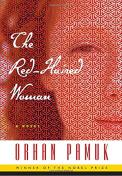
by Orhan Pamuk
Hardcover- $15.51
From the Nobel Prize winner and best-selling author of Snow and My Name Is Red, a fable of fathers and sons and the desires that come ...
Overall rating:
How would you rate this book?
Member ratings
The Red-Haired Woman, Orhan Pamuk, author, John Lee, Katharine McEwan, narrators
In Part One of the novel, Cem Celik is 16 years old. Because his father had abandoned his mother, he was forced to seek summer employment so that he could earn enough money to go to cram school before taking the exams for his higher education. Otherwise his future would be doomed. In this effort, he became an apprentice to Master Mahmut, the well-digger, and a close father/son relationship developed over a short period of time. On one evening, while walking with him, he spied a red-haired woman, Gulcihan, who seemed to catch his eye. He became enthralled with her. Cem is coming of age and feeling things that he had not felt before.
After a tragic event, in which his master is hurt in the well, Cem abandons him and runs away because he is afraid he will be accused of causing the accident which will ruin his life. He places his own well being before that of his master which is considered his greatest sin. Cem never speaks of what he did to anyone for many years, not even his future wife.
In Part Two of the book, years have passed and Cem is happily married, but childless. He and his wife are very compatible and carve out a life for themselves which is very secure financially. When someone claims to be his son, his life’s trajectory turns in a different direction. He discovers that many of the things he had believed for the previous three decades, that had haunted him through the years, were wrong.
In Part Three, the red-haired woman describes her acting career and her past love life including her relationship with Cem and Akin Celik, and Turhan and Turgay, her husbands. She has a son named Enver whose paternity has only recently been discovered. He has been charged with the murder of his father, and she attempts to explain why her son should be judged innocent of the crime he committed.
As the master and apprentice tell each other stories, of father/son relationships and the ensuing tragedies of fratricide and patricide their relationship deepens. Using Sophocles classic about Oedipus and Laius and The Shanamara, a Persian poem containing the legend of Rostam and Sohrab, the reader sees the troubled relationships in families, the difficulties between fathers and sons and the resultant dysfunction from those problems. There is often a deep resentment toward the absent parent for the lack of guidance that is desired from that parent. Politics and the absence of faith, in this case, the Muslim faith, is also blamed as there seems to be a lack of responsibility for one’s actions or an impulsiveness that leads to rash behavior, which religion might otherwise prevent, since irresponsible behavior would be absolutely forbidden.
The moral of the story seems to be the need for a strong father figure in a boy’s life in order for him to take the right path. The lopsided bond of mother and son, without the equal bond of father and son often leads to disastrous consequences. Resentments develop, sometimes without rational reasons, simply based on bitterness. The result of the relationship between Mahmut and Cem and between the red-haired woman and Cem, haunted our main character, and he was powerless to stop fate from intervening and changing the course of his life.
Several questions were posed to me. Why did Cem choose the wife he did? Was her similarity to his mother and the red-haired woman a motivating factor? Did he punish Master Mahmut and abandon him because he had been abandoned by his own father? Were his mother and Enver’s mother too close to their sons, not allowing them to mature in a stable way, not providing them with a way to respect themselves even though their fathers had abandoned them, whether willfully or otherwise? Should immaturity and youth be used as an excuse for reprehensible behavior? Does anyone escape ultimate judgment for their behavior? Abandonment, deceptions and secrets have grave consequences.
John Lee is one of my favorite narrators and he didn’t disappoint me. While Katharine McEwan did a fine job, I didn’t quite match her voice to the personality with which I had identified Gulcihan, the red-haired woman. I felt the red-haired woman was more complicit in the outcome of the novel, than comes across from her portrayal. The narrator’s voice radiated too much innocence for her part. There seemed to be a universal lack of responsibility on the part of the characters for their own behavior, with each blaming their personal misfortune on the behavior of someone or something else.
This novel will provide a great many controversial topics for discussion.
Book Club HQ to over 90,000+ book clubs and ready to welcome yours.
Get free weekly updates on top club picks, book giveaways, author events and more








